教学课件 --人教版中学英语七年级(下)UNIT 2 Section A 1a-2d(第1课时)
文档属性
| 名称 | 教学课件 --人教版中学英语七年级(下)UNIT 2 Section A 1a-2d(第1课时) | 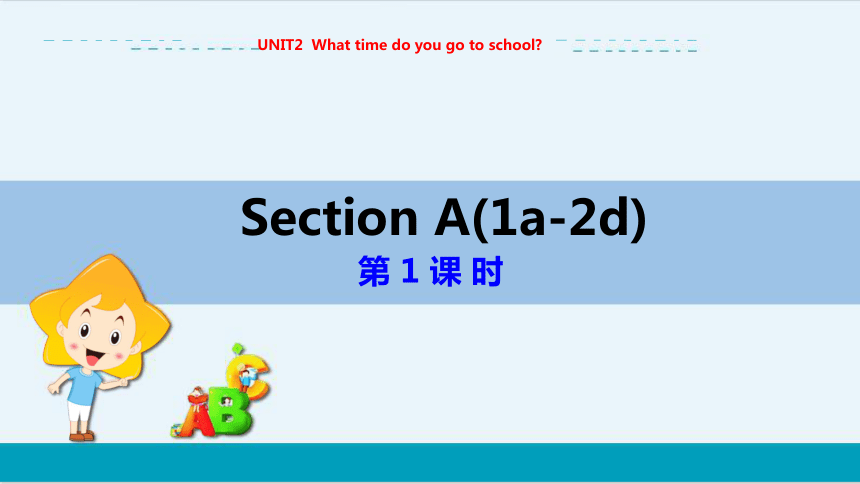 | |
| 格式 | pptx | ||
| 文件大小 | 4.2MB | ||
| 资源类型 | 试卷 | ||
| 版本资源 | 人教新目标(Go for it)版 | ||
| 科目 | 英语 | ||
| 更新时间 | 2024-02-21 19:48:02 | ||
图片预览

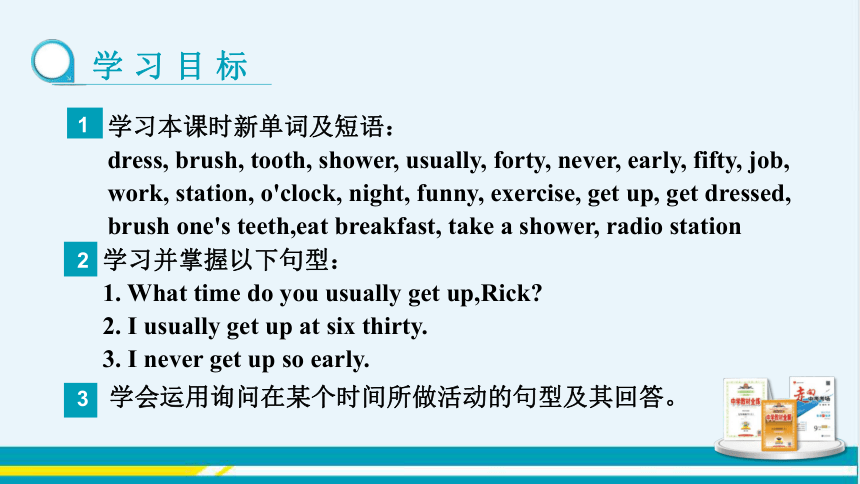
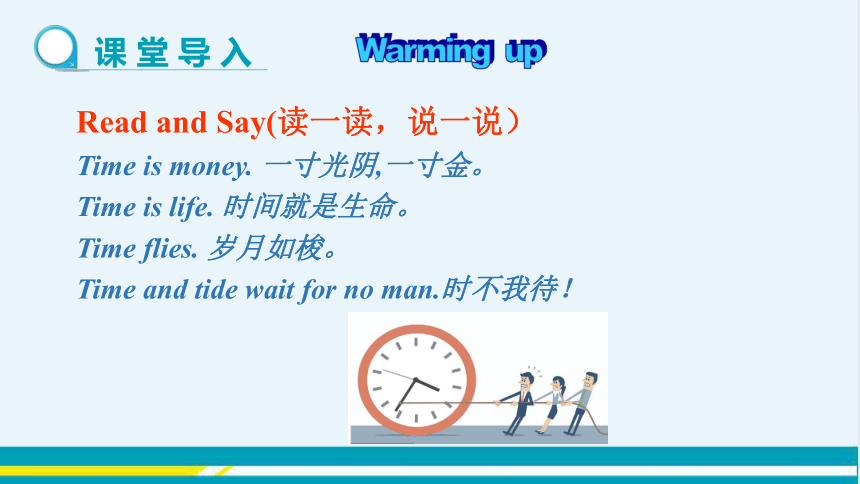
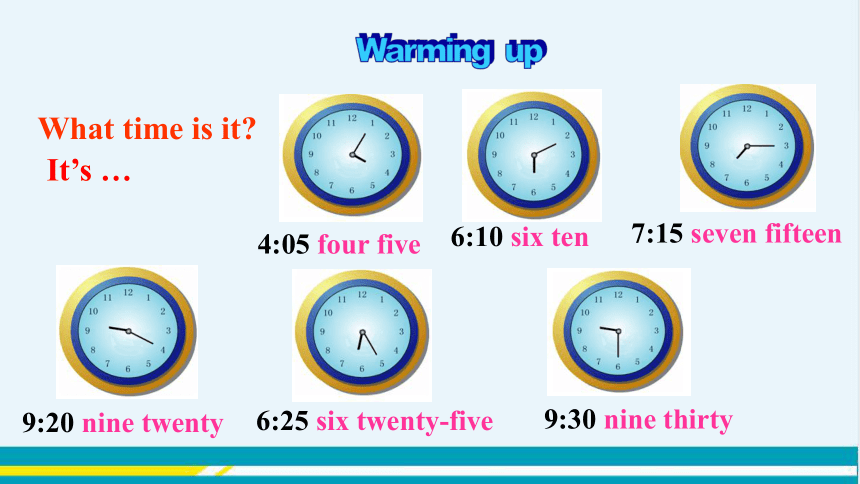
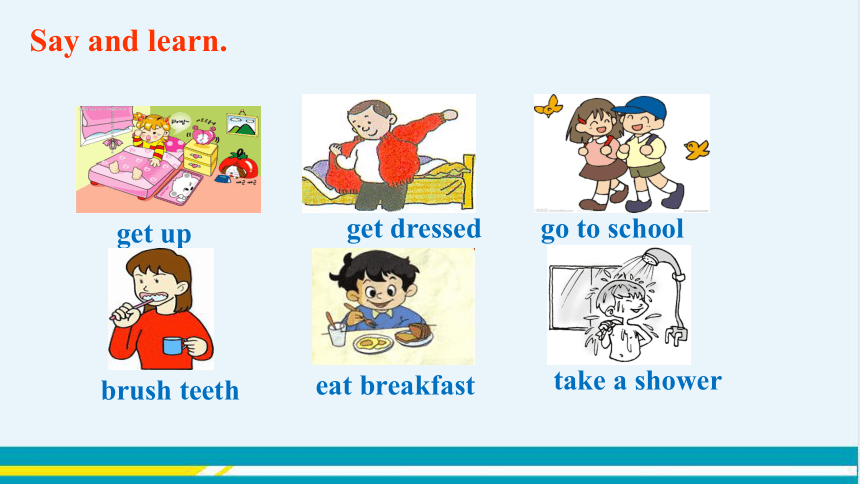
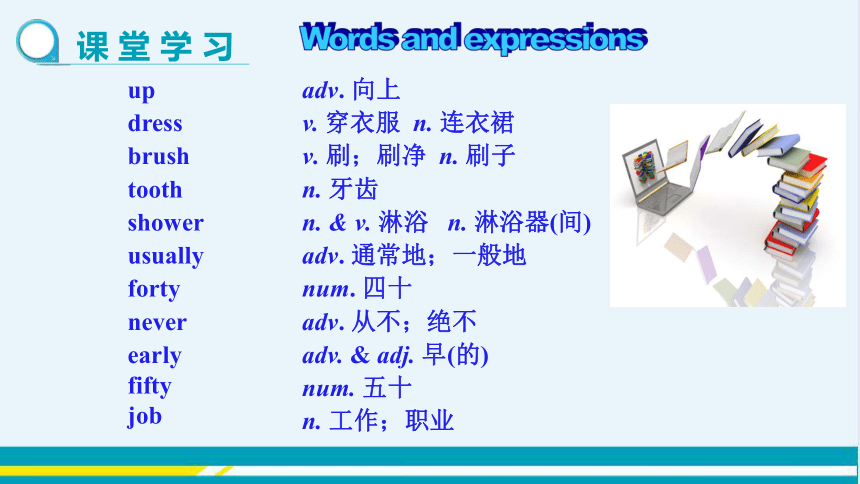
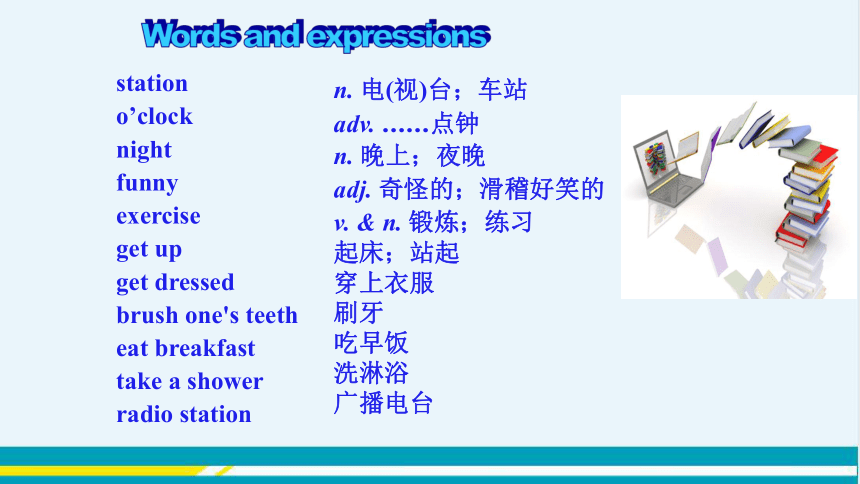
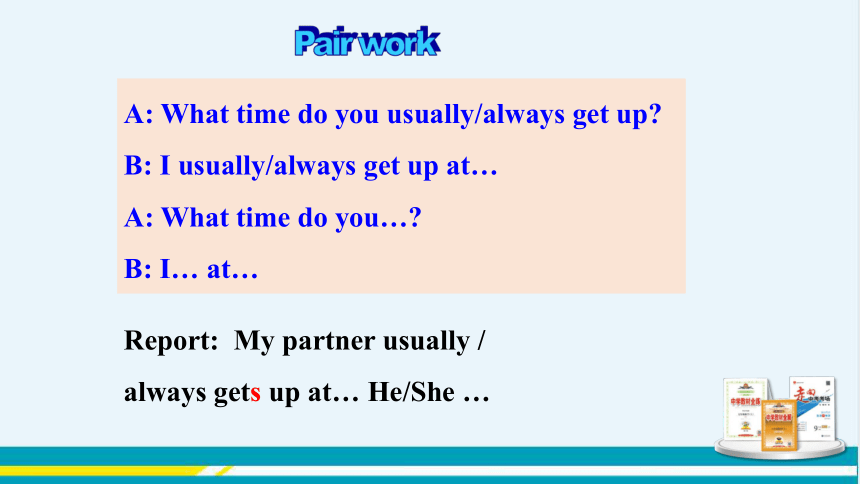
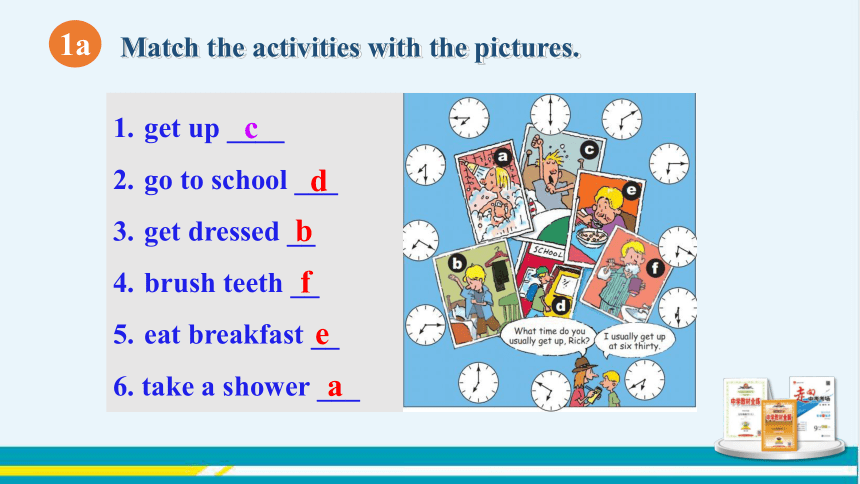
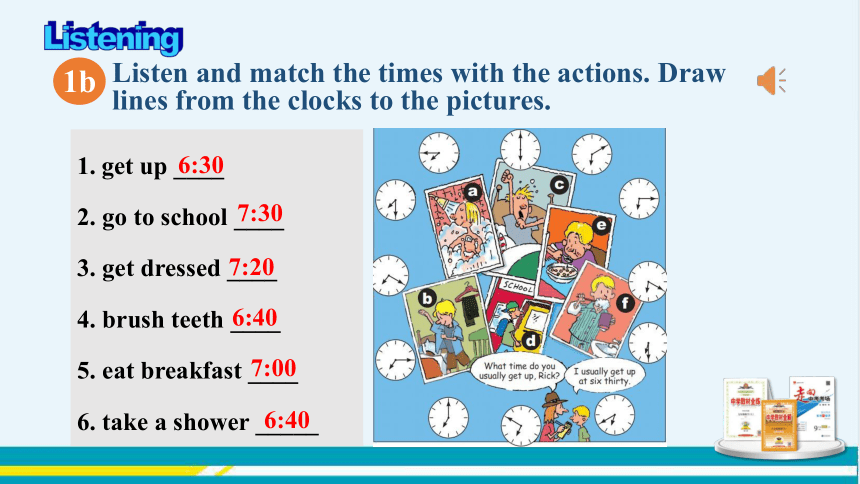
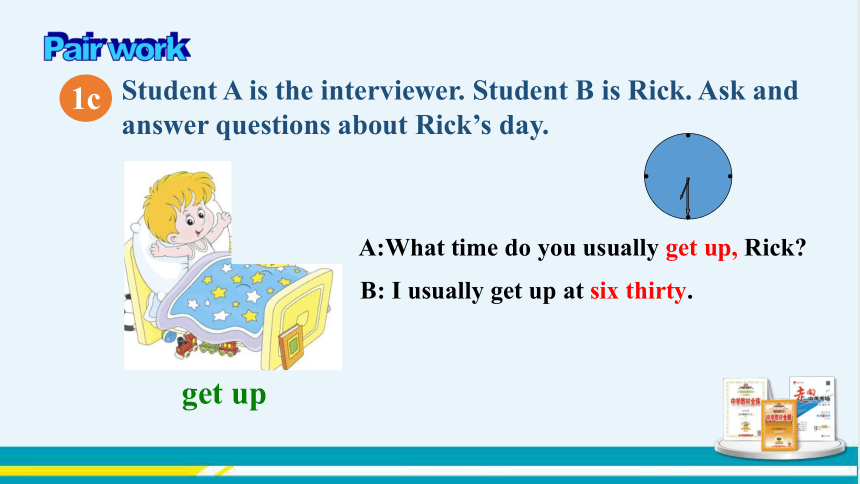
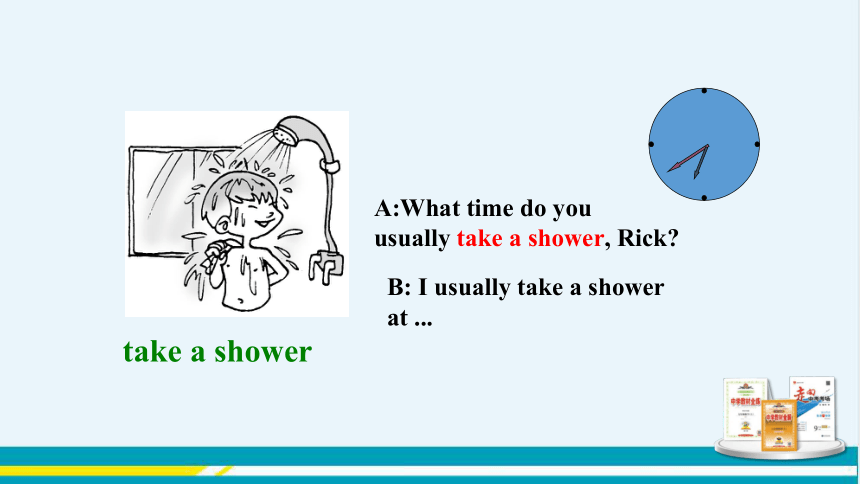
文档简介
(共33张PPT)
Section A(1a-2d)
第 1 课 时
UNIT2 What time do you go to school
学 习 目 标
学习本课时新单词及短语:
dress, brush, tooth, shower, usually, forty, never, early, fifty, job, work, station, o'clock, night, funny, exercise, get up, get dressed, brush one's teeth,eat breakfast, take a shower, radio station
1
2
学习并掌握以下句型:
1. What time do you usually get up,Rick
2. I usually get up at six thirty.
3. I never get up so early.
3
学会运用询问在某个时间所做活动的句型及其回答。
课 堂 导 入
Warming up
Read and Say(读一读,说一说)
Time is money. 一寸光阴,一寸金。
Time is life. 时间就是生命。
Time flies. 岁月如梭。
Time and tide wait for no man.时不我待!
Warming up
What time is it
It’s …
4:05 four five
6:10 six ten
7:15 seven fifteen
9:20 nine twenty
6:25 six twenty-five
9:30 nine thirty
Say and learn.
get up
get dressed
go to school
brush teeth
eat breakfast
take a shower
Words and expressions
课 堂 学 习
up
dress
brush
tooth
shower
usually
forty
never
early
fifty
job
adv. 向上
v. 穿衣服 n. 连衣裙
v. 刷;刷净 n. 刷子
n. 牙齿
n. & v. 淋浴 n. 淋浴器(间)
adv. 通常地;一般地
num. 四十
adv. 从不;绝不
adv. & adj. 早(的)
num. 五十
n. 工作;职业
Words and expressions
station
o’clock
night
funny
exercise
get up
get dressed
brush one's teeth
eat breakfast
take a shower
radio station
n. 电(视)台;车站
adv. ……点钟
n. 晚上;夜晚
adj. 奇怪的;滑稽好笑的
v. & n. 锻炼;练习
起床;站起
穿上衣服
刷牙
吃早饭
洗淋浴
广播电台
Pair work
A: What time do you usually/always get up
B: I usually/always get up at…
A: What time do you…
B: I… at…
Report: My partner usually /
always gets up at… He/She …
Match the activities with the pictures.
get up ____
go to school ___
get dressed __
brush teeth __
eat breakfast __
6. take a shower ___
c
d
b
f
e
a
1a
Listening
Listen and match the times with the actions. Draw lines from the clocks to the pictures.
1b
get up ____
2. go to school ____
3. get dressed ____
4. brush teeth ____
5. eat breakfast ____
6. take a shower _____
6:30
7:30
7:20
6:40
7:00
6:40
Student A is the interviewer. Student B is Rick. Ask and answer questions about Rick’s day.
1c
Pair work
A:What time do you usually get up, Rick
B: I usually get up at six thirty.
get up
A:What time do you usually take a shower, Rick
B: I usually take a shower at ...
take a shower
A:What time do you usually get dressed, Rick
B: I usually get dressed at ...
get dressed
A:What time do you usually brush teeth, Rick
B: I usually brush teeth at ...
brush teeth
A:What time do you usually have breakfast, Rick
B: I usually have breakfast at ...
have breakfast
A:What time do you usually go to school, Rick
B: I usually go to school at ...
go to school
Listening
2a
Listen to the conversation and complete the sentences.
Jim has _______brothers and ______sisters.
Jim’s family has __________ shower.
shower
two
two
only one
Listening
2b
Listen again. Complete the shower schedule for Jim’s family.
Name Bob Mary Jack Jim Anna
Time
5:30
5:50
6:15
6:30
6:45
2c
Pair work
Now talk about yourself.
What time do you usually get up
I always get up at five fifty.
Wow! I never get up so early.
Pair work
get up
eat breakfast
go to school
have classes
A: What time do you usually get up/…
B: I usually get up/… at …
A: What time do you usually get up/…
B: I usually get up/… at …
have lunch
go home
take a shower
go to bed
2d
Role-play
Role-play the conversation.
at a radio station
Scott
2d
Role-play
Role-play the conversation.
Time Activities
12:00 pm-6:00 am radio show
8:30 pm get up
9:00 pm eat breakfast
about 10:20 pm exercise
11:00 pm go to work
Scott’s schedule(时刻表)
Language points
1. —What time do you usually get up, Rick?
—I usually get up at six thirty.
(1) what time引导特殊疑问句,询问时间或事情发生的具体时间点。其答语通常是具体的时间点。
—What time is it now?现在几点钟了?
—It’s seven o’clock.七点整。
(2) usually为频度副词,意为“通常” 。常用在一般现在时的句子中。
I usually go to the library to borrow books. 我通常去图书馆借书。
(3) get up 意为“起床”,为固定动词短语。其对应短语为go to bed,意为“上床睡觉”。
She gets up at six every morning.
她每天早晨六点起床。
(4) at eight thirty 在六点半。介词at意为“在……”,用来表示时间,其后一般跟钟点。常见短语:at+整数+o’clock 在几点。
at 4:00 在4点;at 8:15 在8点15分;at 7 o’clock 在七点整。
2.【辨析】at、on 与 in
at 的搭配:at noon;at night;at 9:00
on的搭配:on November 1st;on Tuesday evening;
on the morning of Monday
in的搭配:in April;in summer;in 2018; in the morning
3. I never get up so early.
(1) never为频度副词,意为“从不;绝不” 。它表示的可能性为零。
I can never be a nurse. I’m not a very patient girl.
我绝不可能成为一名护士。我不是一个非常有耐心的女孩子。
(2) early 此处作副词,意为“早地” ,修饰动词。
We arrived early the next day.
我们第二天到得很早。
4. Scott has an interesting job.
(1) interesting 作形容词, 意为“有趣的,令人感兴趣的”。常用来修饰物,可作表语和定语。
This is an interesting book. 这是一本有趣的书。
The film is very interesting. 这部电影很有趣。
【辨析】interesting 与 interested
interesting 令人感兴趣的,有趣的。常用来修饰或说明事物。
interested 感兴趣的。常用来说明人的感受。
固定搭配:be interested in sth. 对……感兴趣
5. From twelve o’clock at night to six o’clock in the morning.
from...to... 意为“从……到……”。它可用来表示时间或地点。
We go to work from Monday to Friday.我们星期一到星期五上班。
How far is it from your school to the library in the city?
从你的学校到城里的图书馆有多远?
6. That’s a funny time for breakfast!
funny 作形容词,意为“奇怪的;滑稽好笑的”。
Jack often tells us some funny stories. 杰克经常给我们讲一些搞笑的故事。
【拓展】fun n. 娱乐, 玩笑, 嬉笑;有趣的人或事物
Summary
Main words and phrases:
dress, brush, tooth, shower, usually, forty, never, early, fifty, job, work, station, o'clock, night, funny, exercise, get up, get dressed, brush one's teeth,eat breakfast, take a shower, radio station
Main sentences:
1. What time do you usually get up,Rick
2. I usually get up at six thirty.
3. I never get up so early.
课 堂 达 标
一、单项选择。
1. Rules are helpful to us,________ we have to follow them.
A.so B.but C.or D.because
2. We work ________ morning ________ night.
A.either;or B.from;to C.from;at D.good;at
3. —Why do you look so excited, Tim
—I've just got a wonderful________.
A.news B.job C.Furniture D.work
4. —What do you think of the TV show
—Well, I can't stand it, but my son thinks it ________.
A.boring B.frustrating
C.interesting D.meaningless
A
B
B
C
二、 选词(组)填空。
at night be late for early
at six forty funny get up
1. Alice usually ________ at 6:30 in the morning.
2. His uncle works from 10:00 _________ to 6:00 in the morning.
3. His brother never goes to school so ______.
4. The lazy boy ___ always _______ school.
5. My sister always takes a shower ___________.
6. Look at that boy. He’s really ______.
gets up
at night
early
is late for
at six forty
funny
1. Review the phrases you have learned in this part.
2. Write a short passage about what you usually do in a day.
Homework
Thank you !
Section A(1a-2d)
第 1 课 时
UNIT2 What time do you go to school
学 习 目 标
学习本课时新单词及短语:
dress, brush, tooth, shower, usually, forty, never, early, fifty, job, work, station, o'clock, night, funny, exercise, get up, get dressed, brush one's teeth,eat breakfast, take a shower, radio station
1
2
学习并掌握以下句型:
1. What time do you usually get up,Rick
2. I usually get up at six thirty.
3. I never get up so early.
3
学会运用询问在某个时间所做活动的句型及其回答。
课 堂 导 入
Warming up
Read and Say(读一读,说一说)
Time is money. 一寸光阴,一寸金。
Time is life. 时间就是生命。
Time flies. 岁月如梭。
Time and tide wait for no man.时不我待!
Warming up
What time is it
It’s …
4:05 four five
6:10 six ten
7:15 seven fifteen
9:20 nine twenty
6:25 six twenty-five
9:30 nine thirty
Say and learn.
get up
get dressed
go to school
brush teeth
eat breakfast
take a shower
Words and expressions
课 堂 学 习
up
dress
brush
tooth
shower
usually
forty
never
early
fifty
job
adv. 向上
v. 穿衣服 n. 连衣裙
v. 刷;刷净 n. 刷子
n. 牙齿
n. & v. 淋浴 n. 淋浴器(间)
adv. 通常地;一般地
num. 四十
adv. 从不;绝不
adv. & adj. 早(的)
num. 五十
n. 工作;职业
Words and expressions
station
o’clock
night
funny
exercise
get up
get dressed
brush one's teeth
eat breakfast
take a shower
radio station
n. 电(视)台;车站
adv. ……点钟
n. 晚上;夜晚
adj. 奇怪的;滑稽好笑的
v. & n. 锻炼;练习
起床;站起
穿上衣服
刷牙
吃早饭
洗淋浴
广播电台
Pair work
A: What time do you usually/always get up
B: I usually/always get up at…
A: What time do you…
B: I… at…
Report: My partner usually /
always gets up at… He/She …
Match the activities with the pictures.
get up ____
go to school ___
get dressed __
brush teeth __
eat breakfast __
6. take a shower ___
c
d
b
f
e
a
1a
Listening
Listen and match the times with the actions. Draw lines from the clocks to the pictures.
1b
get up ____
2. go to school ____
3. get dressed ____
4. brush teeth ____
5. eat breakfast ____
6. take a shower _____
6:30
7:30
7:20
6:40
7:00
6:40
Student A is the interviewer. Student B is Rick. Ask and answer questions about Rick’s day.
1c
Pair work
A:What time do you usually get up, Rick
B: I usually get up at six thirty.
get up
A:What time do you usually take a shower, Rick
B: I usually take a shower at ...
take a shower
A:What time do you usually get dressed, Rick
B: I usually get dressed at ...
get dressed
A:What time do you usually brush teeth, Rick
B: I usually brush teeth at ...
brush teeth
A:What time do you usually have breakfast, Rick
B: I usually have breakfast at ...
have breakfast
A:What time do you usually go to school, Rick
B: I usually go to school at ...
go to school
Listening
2a
Listen to the conversation and complete the sentences.
Jim has _______brothers and ______sisters.
Jim’s family has __________ shower.
shower
two
two
only one
Listening
2b
Listen again. Complete the shower schedule for Jim’s family.
Name Bob Mary Jack Jim Anna
Time
5:30
5:50
6:15
6:30
6:45
2c
Pair work
Now talk about yourself.
What time do you usually get up
I always get up at five fifty.
Wow! I never get up so early.
Pair work
get up
eat breakfast
go to school
have classes
A: What time do you usually get up/…
B: I usually get up/… at …
A: What time do you usually get up/…
B: I usually get up/… at …
have lunch
go home
take a shower
go to bed
2d
Role-play
Role-play the conversation.
at a radio station
Scott
2d
Role-play
Role-play the conversation.
Time Activities
12:00 pm-6:00 am radio show
8:30 pm get up
9:00 pm eat breakfast
about 10:20 pm exercise
11:00 pm go to work
Scott’s schedule(时刻表)
Language points
1. —What time do you usually get up, Rick?
—I usually get up at six thirty.
(1) what time引导特殊疑问句,询问时间或事情发生的具体时间点。其答语通常是具体的时间点。
—What time is it now?现在几点钟了?
—It’s seven o’clock.七点整。
(2) usually为频度副词,意为“通常” 。常用在一般现在时的句子中。
I usually go to the library to borrow books. 我通常去图书馆借书。
(3) get up 意为“起床”,为固定动词短语。其对应短语为go to bed,意为“上床睡觉”。
She gets up at six every morning.
她每天早晨六点起床。
(4) at eight thirty 在六点半。介词at意为“在……”,用来表示时间,其后一般跟钟点。常见短语:at+整数+o’clock 在几点。
at 4:00 在4点;at 8:15 在8点15分;at 7 o’clock 在七点整。
2.【辨析】at、on 与 in
at 的搭配:at noon;at night;at 9:00
on的搭配:on November 1st;on Tuesday evening;
on the morning of Monday
in的搭配:in April;in summer;in 2018; in the morning
3. I never get up so early.
(1) never为频度副词,意为“从不;绝不” 。它表示的可能性为零。
I can never be a nurse. I’m not a very patient girl.
我绝不可能成为一名护士。我不是一个非常有耐心的女孩子。
(2) early 此处作副词,意为“早地” ,修饰动词。
We arrived early the next day.
我们第二天到得很早。
4. Scott has an interesting job.
(1) interesting 作形容词, 意为“有趣的,令人感兴趣的”。常用来修饰物,可作表语和定语。
This is an interesting book. 这是一本有趣的书。
The film is very interesting. 这部电影很有趣。
【辨析】interesting 与 interested
interesting 令人感兴趣的,有趣的。常用来修饰或说明事物。
interested 感兴趣的。常用来说明人的感受。
固定搭配:be interested in sth. 对……感兴趣
5. From twelve o’clock at night to six o’clock in the morning.
from...to... 意为“从……到……”。它可用来表示时间或地点。
We go to work from Monday to Friday.我们星期一到星期五上班。
How far is it from your school to the library in the city?
从你的学校到城里的图书馆有多远?
6. That’s a funny time for breakfast!
funny 作形容词,意为“奇怪的;滑稽好笑的”。
Jack often tells us some funny stories. 杰克经常给我们讲一些搞笑的故事。
【拓展】fun n. 娱乐, 玩笑, 嬉笑;有趣的人或事物
Summary
Main words and phrases:
dress, brush, tooth, shower, usually, forty, never, early, fifty, job, work, station, o'clock, night, funny, exercise, get up, get dressed, brush one's teeth,eat breakfast, take a shower, radio station
Main sentences:
1. What time do you usually get up,Rick
2. I usually get up at six thirty.
3. I never get up so early.
课 堂 达 标
一、单项选择。
1. Rules are helpful to us,________ we have to follow them.
A.so B.but C.or D.because
2. We work ________ morning ________ night.
A.either;or B.from;to C.from;at D.good;at
3. —Why do you look so excited, Tim
—I've just got a wonderful________.
A.news B.job C.Furniture D.work
4. —What do you think of the TV show
—Well, I can't stand it, but my son thinks it ________.
A.boring B.frustrating
C.interesting D.meaningless
A
B
B
C
二、 选词(组)填空。
at night be late for early
at six forty funny get up
1. Alice usually ________ at 6:30 in the morning.
2. His uncle works from 10:00 _________ to 6:00 in the morning.
3. His brother never goes to school so ______.
4. The lazy boy ___ always _______ school.
5. My sister always takes a shower ___________.
6. Look at that boy. He’s really ______.
gets up
at night
early
is late for
at six forty
funny
1. Review the phrases you have learned in this part.
2. Write a short passage about what you usually do in a day.
Homework
Thank you !
同课章节目录
- Unit 1 Can you play the guitar?
- Section A
- Section B
- Unit 2 What time do you go to school?
- Section A
- Section B
- Unit 3 How do you get to school?
- Section A
- Section B
- Unit 4 Don't eat in class.
- Section A
- Section B
- Unit 5 Why do you like pandas?
- Section A
- Section B
- Unit 6 I'm watching TV.
- Section A
- Section B
- Review of Units 1-6
- Unit 7 It's raining!
- Section A
- Section B
- Unit 8 Is there a post office near here?
- Section A
- Section B
- Unit 9 What does he look like?
- Section A
- Section B
- Unit 10 I'd like some noodles.
- Section A
- Section B
- Unit 11 How was your school trip?
- Section A
- Section B
- Unit 12 What did you do last weekend?
- Section A
- Section B
